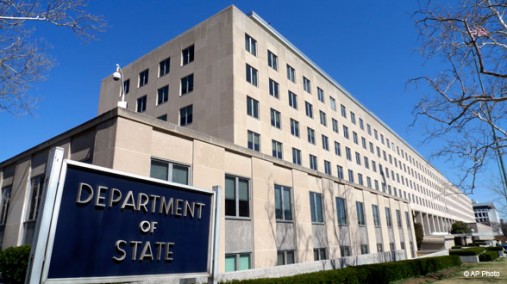Davutoglu’s Yerevan visit can lead to progress in Armenian-Turkish relations: U.S.

By Sara Rajabova
The United States hailed Turkish Foreign Minister's visit to Yerevan as a chance for the normalization of Armenian-Turkish relations.
Ahmet Davutoglu will attend the Foreign Ministers Council of the Organization of Black Sea Economic Cooperation (BSEC) on December 12.
The U.S. State Department said Davutoglu's participation at the meeting of the Black Sea Economic Cooperation Council in Yerevan can lead to dialogue between the leaders of the regional states, Anadolu agency reported, thus resulting in positive progress in Armenian-Turkish relations.
Prior to his visit, Davutoglu reiterated Turkey's position that the normalization of relations between Ankara and Yerevan will bring peace to the South Caucasus, but only if relations between Azerbaijan and Armenia improve and regional conflicts are settled through the principle of territorial integrity.
Davutoglu said the Nagorno-Karabakh conflict, an unresolved dispute between Azerbaijan and Armenia, is the major obstacle in South Caucasus's path to stability and normalization.
Commenting on the issue, Vice-speaker of the Azerbaijani Parliament Bahar Muradova said the policy pursued by Turkey and its official position is that normalization of relations with Armenia begins with the withdrawal of its troops and the liberation of Azerbaijan's occupied territories.
She said there are several factors, noted by mediators, observers, and analysts, that can affect the resolution of the Nagorno-Karabakh conflict.
Muradova said one of the most important factors is the relations between Turkey and Azerbaijan, Turkey and Armenia, and Azerbaijan and Armenia.
"Of course, the one who aims to normalize Turkish-Armenian relations should not ignore that it depends on the Azerbaijani-Turkish and Armenian-Azerbaijani relations. Without considering this, any project will fail. In this regard, I consider these relationships as effective tools," Muradova said.
Armenian-Turkish relations have been strained by a number of historical and political issues, including allegations of Armenian Genocide. Although there is currently no formal diplomatic relations between the two states, it was announced on October 10, 2009 that both countries had agreed to establish mutual diplomatic recognition. However, diplomatic efforts to normalize the relations have failed so far because of the continuing Nagarno-Karabakh conflict between Armenia and Azerbaijan.
The Turkish Government has repeatedly stated that Ankara's position with regard to the Turkish-Armenian and Azerbaijani-Armenian relations is clear and specific. Ankara says negotiations on the normalization of Turkish-Armenian relations can only come about after the liberation of Azerbaijan's occupied territories.
The Nagorno-Karabakh conflict emerged in 1988 when Armenia made territorial claims against Azerbaijan. Since a lengthy war in the early 1990s that displaced over one million Azerbaijanis, Armenian armed forces have occupied over 20 percent of Azerbaijan's internationally recognized territory, including Nagorno-Karabakh and seven adjacent regions.
The UN Security Council's four resolutions on Armenian armed forces' withdrawal have not been enforced to this day.
Peace talks, mediated by Russia, France and the U.S. through the OSCE Minsk Group, are underway on the basis of a peace outline proposed by the Minsk Group's co-chairs, dubbed the Madrid Principles. The negotiations have been largely fruitless so far.
Here we are to serve you with news right now. It does not cost much, but worth your attention.
Choose to support open, independent, quality journalism and subscribe on a monthly basis.
By subscribing to our online newspaper, you can have full digital access to all news, analysis, and much more.
You can also follow AzerNEWS on Twitter @AzerNewsAz or Facebook @AzerNewsNewspaper
Thank you!
